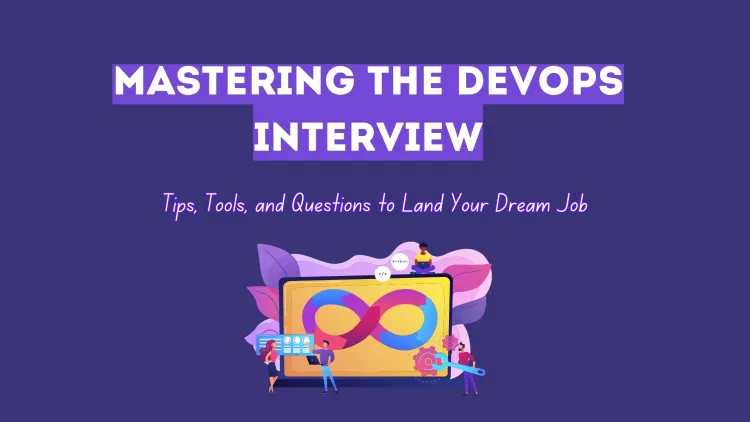Mastering the DevOps Interview | Essential Tips, Tools, and Questions to Ace Your Next Job Opportunity
This blog covers how to prepare for a DevOps job interview, including understanding core principles, mastering tools, practicing scenarios, and preparing for technical and behavioral questions. Additionally, it provides a list of critical interview questions to help candidates excel in their interviews.

The demand for DevOps Engineers has grown significantly as organizations continue to embrace automation, collaboration, and continuous delivery. Preparing for a DevOps job interview involves more than technical knowledge; it also requires showcasing your problem-solving skills, collaboration experience, and understanding of DevOps principles. In this blog, we’ll discuss how to prepare for DevOps job interviews and provide a list of important interview questions to help you ace your next opportunity.
Understand the Core Principles of DevOps
Before attending a DevOps interview, ensure you have a deep understanding of its core principles, including:
- Collaboration: Working closely with development and operations teams.
- Automation: Automating repetitive tasks to save time and reduce errors.
- Continuous Integration and Delivery (CI/CD): Ensuring frequent, error-free deployments.
- Monitoring and Feedback Loops: Tracking performance and addressing issues proactively.
Focus on how these principles lead to faster development cycles, better quality software, and efficient workflows.
Master the Essential DevOps Tools
Employers expect candidates to be proficient in DevOps tools that streamline workflows and processes. Ensure you have hands-on experience with:
- CI/CD Tools: Jenkins, CircleCI, GitLab CI.
- Containerization Platforms: Docker, Kubernetes.
- Infrastructure as Code (IaC): Terraform, Ansible, Chef, Puppet.
- Monitoring and Logging: Prometheus, Grafana, ELK Stack.
- Cloud Platforms: AWS, Azure, Google Cloud Platform (GCP).
Gain Hands-On Experience
Practical experience is critical. Set up personal or collaborative projects to demonstrate your skills. Examples include:
- Building and deploying a CI/CD pipeline using Jenkins.
- Deploying and managing containerized applications using Kubernetes.
- Writing Infrastructure as Code scripts with Terraform or Ansible.
- Monitoring application performance using Prometheus and Grafana.
Learn the Most Common DevOps Practices
Be familiar with the methodologies and best practices that underpin DevOps, such as:
- Agile and Scrum frameworks: Collaboration and iterative development.
- GitOps: Managing infrastructure using Git repositories.
- DevSecOps: Integrating security into DevOps workflows.
Prepare for Behavioral Questions
DevOps is as much about mindset as it is about technical expertise. Interviewers often assess your ability to:
- Collaborate effectively with cross-functional teams.
- Handle conflicts or challenges in a fast-paced environment.
- Drive improvements in existing workflows.
Be ready to share examples of projects where you improved team efficiency or resolved issues.
Be Ready for Problem-Solving Challenges
Interviewers may present real-world scenarios to test your approach to troubleshooting and problem-solving. For example:
- "How would you handle a situation where your CI/CD pipeline fails?"
- "What steps would you take to ensure a smooth application deployment?"
Revise Key Concepts
Brush up on foundational topics to ensure you’re confident during technical discussions:
- Version Control Systems: Git commands, branching, and merging strategies.
- Networking Basics: Understanding DNS, HTTP/HTTPS, firewalls, and load balancers.
- Scripting Languages: Python, Bash, or PowerShell for automation.
Build a DevOps Portfolio
Create a portfolio showcasing your projects, contributions to open-source tools, and personal achievements. Use platforms like GitHub to share:
- Sample Infrastructure as Code templates.
- CI/CD pipeline configurations.
- Kubernetes manifests and deployment scripts.
Practice Mock Interviews
Mock interviews help you familiarize yourself with potential questions and refine your responses. Practice both technical and behavioral questions to gain confidence.
Important Questions for a DevOps Interview
Here are some critical questions that interviewers might ask:
Technical Questions
- What is CI/CD, and why is it important?
- Explain the differences between Docker and Kubernetes.
- How does Infrastructure as Code (IaC) improve DevOps workflows?
- What are the key components of a successful monitoring system?
- How would you troubleshoot a failed application deployment?
- What is the difference between Ansible, Chef, and Puppet?
- Explain how Git works and describe your experience with branching strategies.
- What are the advantages of using container orchestration platforms like Kubernetes?
- How would you handle secrets management in a DevOps pipeline?
- Describe the DevOps lifecycle and the tools used at each stage.
Behavioral Questions
- Describe a challenging DevOps project you worked on and how you resolved the issues.
- How do you approach collaboration between development and operations teams?
- Share an example of how you automated a task to improve efficiency.
- How do you handle situations where priorities conflict between teams?
Bonus Tips
- Stay Updated: Follow blogs, attend webinars, and participate in forums to learn about new DevOps trends and tools.
- Certifications: Certifications like AWS Certified DevOps Engineer or Docker Certified Associate can set you apart.
- Networking: Attend DevOps meetups and connect with industry professionals.
Conclusion
Preparing for a DevOps job interview involves more than memorizing tools and concepts. Employers look for professionals who can combine technical expertise with problem-solving and collaboration skills. By mastering tools, gaining hands-on experience, and preparing for common questions, you can confidently showcase your capabilities and land your dream role in DevOps.
FAQs
-
What is CI/CD, and why is it important in DevOps?
CI/CD stands for Continuous Integration and Continuous Delivery. It ensures frequent, error-free deployments and plays a crucial role in automating development and operations workflows. -
What are the most commonly used tools for DevOps roles?
Popular tools include Jenkins, Docker, Kubernetes, Terraform, Ansible, Prometheus, Grafana, and Git for version control. -
How can I gain hands-on experience with DevOps tools?
You can practice by setting up personal projects, contributing to open-source repositories, or using cloud-based labs and free-tier services like AWS, Azure, or GCP. -
What are some common technical questions asked in a DevOps interview?
Questions may include topics like differences between Docker and Kubernetes, troubleshooting CI/CD pipeline failures, and writing Infrastructure as Code with tools like Terraform or Ansible. -
What behavioral questions should I prepare for in a DevOps interview?
Be ready to discuss past experiences with collaboration, resolving conflicts, improving workflows, and managing high-pressure situations during deployments. -
Are certifications necessary for a DevOps role?
Certifications like AWS Certified DevOps Engineer, Docker Certified Associate, or Kubernetes Administrator can strengthen your resume but are not mandatory if you have hands-on experience. -
How can I showcase my DevOps skills during the interview?
Present a portfolio with projects like CI/CD pipelines, Kubernetes setups, or Infrastructure as Code scripts. Use platforms like GitHub to share your work. -
What scripting languages should I know for a DevOps interview?
Languages like Python, Bash, and PowerShell are valuable for automating tasks and writing scripts in DevOps workflows. -
How do I answer problem-solving questions in a DevOps interview?
Approach problems methodically by explaining how you would identify the root cause, analyze data, and implement a solution. Use examples from past experiences if possible. -
How do I stay updated on new DevOps tools and practices?
Follow industry blogs, attend webinars, join DevOps communities, and participate in forums to stay informed about the latest trends and advancements.











![Top 10 Ethical Hackers in the World [2025]](https://www.webasha.com/blog/uploads/images/202408/image_100x75_66c2f983c207b.webp)

![[2025] Top 100+ VAPT Interview Questions and Answers](https://www.webasha.com/blog/uploads/images/image_100x75_6512b1e4b64f7.jpg)









